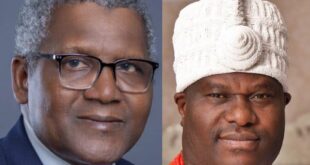BY ABU-SATAR HAMED
ADO EKITI, EKITI STATE, NIGERIA – Ekiti State Governor, Biodun Oyebanji, has dissolved the State Executive Council with immediate effect, a sweeping move that has stirred speculation of looming defections and behind-the-scenes political maneuvering.
The directive affects all Commissioners and Special Advisers, who have been ordered to hand over to the most senior civil servants or Permanent Secretaries in their respective ministries, departments, and agencies.
However, not all officials were affected. Exempt from the dissolution are key cabinet members, including the Attorney General and Commissioner for Justice; the Commissioners for Health and Human Services; Agriculture and Food Security; Education; Works; and Trade, Investment, Industry, and Cooperatives.
Also retained are the Special Advisers on Special Education and Social Inclusion, and Lands, Survey and e-GIS. Directors General who are part of the State Executive Council – notably those leading the Office of Transformation and Service Delivery, the Sustainable Development Goals and Project Monitoring Office, and the Bureau of Public Procurement – also remain in place.
The announcement, dated August 10, 2025, was conveyed in an official statement signed by the Secretary to the State Government, Prof. Habibat Adubiaro.
The governor expressed gratitude to the outgoing council members for their service and wished them well in their future pursuits.
The timing of the shake-up has added fuel to growing political speculation.
Observers point to recent moves by businessman and former governorship aspirant Kayode Ojo – reportedly aligning with the African Democratic Congress (ADC) – as a potential catalyst.
Insiders suggest that strategic negotiations may be underway between Oyebanji’s inner circle, Ojo’s camp, and influential ADC stakeholders, hinting at a broader realignment ahead of the next election cycle.
Though no official declarations have been made, the restructuring is widely seen as a calculated effort to consolidate power and preempt potential threats in the evolving political landscape.
 Startrend International Magazine For Your Latest News And Entertainment Gists
Startrend International Magazine For Your Latest News And Entertainment Gists





